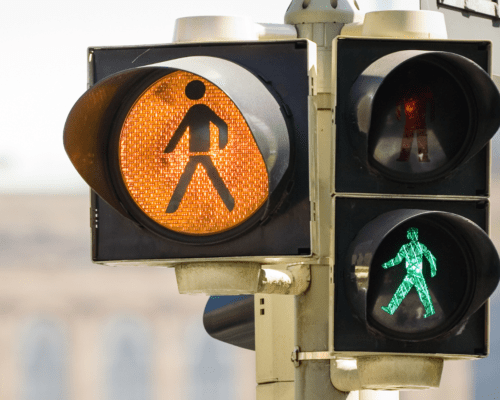Houston Crosswalk Laws and Safety Tips for Pedestrians

In compliance with Texas law, pedestrians have the right of way in crosswalks, and drivers owe them a duty of care. Relevant local laws dictate that vehicles must yield to pedestrians in crosswalks, and failure to do so can have legal consequences. In the unfortunate event of a crosswalk accident, drivers may face liability for injuries caused due to failure to yield. To enhance crosswalk safety, all road users must prioritize pedestrian safety.
However, even if pedestrians remain vigilant and follow safety tips, we know accidents can still happen. If you suffered injuries in a crosswalk accident, your best course of action is to contact a Houston pedestrian injury lawyer as soon as possible. Your attorney can tell you if you have a case and what damages you may be entitled to claim compensation for, such as medical bills and missed time from work.
Texas Crosswalk Laws
In Texas, the duty of care for drivers in relation to pedestrians in crosswalks is established through several relevant laws. These laws articulate the importance of yielding to pedestrians and exercising caution in areas where pedestrians have the right of way. Here are some key Texas crosswalk laws that establish a duty of care for drivers:
- Right of way at crosswalks: A driver must yield the right of way to a pedestrian who is crossing a roadway in a crosswalk, whether the crosswalk is marked or unmarked. The duty of care is established by giving pedestrians priority in these designated areas.
- Exercise of due care: Drivers are required to exercise due care to avoid colliding with a pedestrian on a roadway. This includes giving an audible warning when necessary and exercising proper caution, especially in areas where pedestrians may be present, such as crosswalks.
- Prohibitions against passing stopped school buses: While primarily related to school buses, this law underscores the duty of care by prohibiting drivers from passing a school bus that is stopped to load or unload children. This cautionary approach extends to areas where pedestrians, including children, may be present.
- Reduced speed in school zones: In school zones, where pedestrians, particularly children, are likely to be present, drivers are required to reduce their speed. Adhering to reduced speed limits in these areas is a demonstration of the duty of care to ensure pedestrian safety.
- Duty to yield to pedestrians at walkway A driver emerging from or entering an alley, building, private road, or driveway must yield the right of way to pedestrians using the walkway.
Crosswalk Safety Tips
Given their vulnerability to injury relative to motor vehicle drivers, pedestrian safety in crosswalks is a collective responsibility. Pedestrians can enhance their safety by being vigilant and following vital safety practices, such as:
- Use designated crosswalks: Always use designated crosswalks when crossing the street. This increases your visibility to drivers and ensures that you are crossing at a location where drivers expect pedestrians.
- Make eye contact: Make eye contact with drivers before crossing the street. This ensures that drivers see you and are aware of your intention to cross. Never assume a driver has seen you; proactive communication is key.
- Be visible: Wear bright or reflective clothing, especially during low-light conditions. Increasing your visibility can dramatically reduce the risk of accidents.
Were You Injured in a Houston Crosswalk Accident?
If you sustained serious injuries in a crosswalk accident, DK Law is here to serve as your advocate and legal champion. Our Houston personal injury law firm is dedicated to protecting the rights of pedestrians and achieving justice for your injuries. We can provide guidance on your legal options and help you understand your rights so that you can secure the compensation you deserve.
Your recovery is our top priority. Contact us at (281) 402-8856 today to schedule a free consultation.